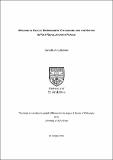Files in this item
Madame de Genlis : environment, citizenship, and the nation in post-revolutionary France
Item metadata
| dc.contributor.advisor | Evans, David Elwyn | |
| dc.contributor.author | Berrow, Danielle Amy | |
| dc.coverage.spatial | 211 p. | en_US |
| dc.date.accessioned | 2019-07-01T11:19:44Z | |
| dc.date.available | 2019-07-01T11:19:44Z | |
| dc.date.issued | 2016-06-23 | |
| dc.identifier.uri | https://hdl.handle.net/10023/18012 | |
| dc.description.abstract | Through an ecocritical lens, this thesis investigates the interrelatedness of the themes of environment, citizenship, and nation in Madame de Genlis’s depiction of post-Revolutionary France. At the heart of the ecocritical project is the notion that humankind must re-evaluate its relationship with the endangered natural world in order to protect the ecosphere; ecocriticism provides tools for re-conceptualising the ways human communities exist, and have existed, in their respective environments. A prolific author of the late eighteenth and early nineteenth centuries, Madame de Genlis engages with such issues in her texts, responding to serious threats posed to the survival of rural communities following the French Revolution, such as the disintegration of socio-political hierarchies, the rise of individualism, and the mismanagement of agricultural land. In the light of post-Revolutionary discourses of liberté, égalité, and fraternité, this thesis explores how Madame de Genlis’s texts present reconstructive narrative strategies for coming to terms with dramatic socio-political upheaval. In particular, her instructional texts - hitherto neglected by scholarship - encourage readers to re-personalise their relationship with the natural world by exploring the multiple moral and practical dimensions of the rural home. Madame de Genlis’s preoccupation with the natural world, expressed here in terms of a ‘rural model’, is the subject of the first chapter. The second chapter examines the notion of social responsibility within this model, while the third chapter considers the ways in which texts, as socio-cultural products, contribute to the re-imagining of a nation under construction. | en |
| dc.language.iso | en | en_US |
| dc.publisher | University of St Andrews | |
| dc.subject | Post-Revolutionary France | en |
| dc.subject | Madame de Genlis | |
| dc.subject | Ecocriticism | en |
| dc.subject | Citizenship | en |
| dc.subject | Environment | en |
| dc.subject | Nation | en |
| dc.subject | France | en |
| dc.subject | Nineteenth century | en |
| dc.subject | Rural home | en |
| dc.subject.lcc | PQ1985.G5Z5B4 | |
| dc.subject.lcsh | Genlis, Stéphanie Félicité, comtesse de, 1746-1830 | |
| dc.subject.lcsh | Politics and literature--France--History--18th century | en |
| dc.subject.lcsh | Women authors, French--Political activity | en |
| dc.subject.lcsh | Nature in literature | en |
| dc.subject.lcsh | Ecology in literature | en |
| dc.title | Madame de Genlis : environment, citizenship, and the nation in post-revolutionary France | en_US |
| dc.type | Thesis | en_US |
| dc.contributor.sponsor | Gapper Charitable Trust | en_US |
| dc.type.qualificationlevel | Doctoral | en_US |
| dc.type.qualificationname | PhD Doctor of Philosophy | en_US |
| dc.publisher.institution | The University of St Andrews | en_US |
This item appears in the following Collection(s)
Items in the St Andrews Research Repository are protected by copyright, with all rights reserved, unless otherwise indicated.

